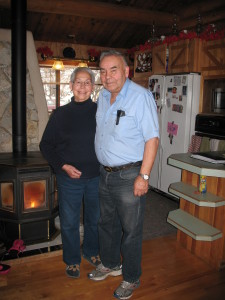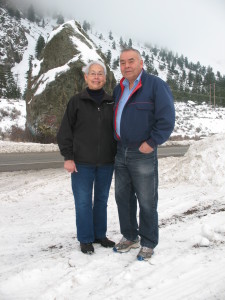Henry and Barb Allison live on Reserve land directly across from the iconic Standing Rock on Highway #3 near Keremeos. From the  outset of our 2 hour conversation with them in their immaculate log home, my wife Linda and I were impressed with their warmth and congeniality.
outset of our 2 hour conversation with them in their immaculate log home, my wife Linda and I were impressed with their warmth and congeniality.
My interest in them stems in part from their status as Elders in the Lower Similkameen Indian Band. I was also curious about Standing Rock, a revered First Nations ceremonial site.
In response to my question about their home, Henry said, “I was a logger. I personally logged the trees for the house. I traded logs in exchange for the construction.”
I encouraged Henry to continue. “We weren’t going to build on this

site,” he said, “but Barb’s mom owned the land and she insisted we build here so we could protect Standing Rock.” They have been diligent in carrying out her wish, at times telling people not to deface the Rock with writing.
Henry was born in Princeton and lived in Hedley, attending school here to the end of grade 6. “It wasn’t easy,” he said. “The other kids teased us a lot because we were Indians. For a time we had to sit on a bench along the wall. The white kids had desks.” He completed grade 8 in Keremeos. In grade 9 his teacher said, “We don’t know how you’re doing it, but you must be cheating. You couldn’t be getting such high marks.” Frustrated by the racially inspired accusations, he quit school.
It was at the Keremeos School that he met Barb. They come from very different families. Barb’s parents were ranchers, living in Chopaka. “Dad was sent to a residential school,” she told us. “When the authorities came for us, he wouldn’t let them take us away.” She and her siblings rode horses across the Similkameen River to their school in Cawston. Like Henry, she and other Indian children had to initially sit on a bench against the wall.
Especially at that age, being Aboriginal was difficult. “One day some white boys told us they would wait for us at the railroad tracks,” she said. “They were going to beat us up. We waited at the school, hoping they would leave. Finally we went to meet them. When we put up our fists to defend ourselves, they ran away.”
Henry’s mom had been taken to a residential school at age 10 and wasn’t returned home until she was 18. “She didn’t see her mother all those years,” he said. “She never learned to be a mother and as an adult alcohol got a hold of her. Once, when I was 8, us kids were left with cousins in a cabin in the bush near Hope. We fished and picked berries to feed ourselves. We didn’t know if our parents would ever return. I felt abandoned.”
“I didn’t understand her life until I attended a workshop about residential school experience,” he said. “Then I was finally able to forgive her.”
Henry grew up to be physically robust, with a desire to leave his past behind. Working in the bush, he became a skilled logger, eventually owning 2 mills and his own logging show. He and Barb began dating and he gave her an engagement ring as a graduation gift.
“That really upset my mom,” Barb recalls. “She was completely against our engagement. She wanted me to go to university and become a lawyer.”
Barb and Henry met with her parents to talk. Finally her dad said,“ we better let them get married or they’ll run away.”
Henry was non-status at the time so when they got married, Barb lost her status. Later she and a group of women travelled to Ottawa to plead for status and it was granted. “I had some trouble persuading them I was Indian,” she said. Possibly the bureaucrats in Ottawa didn’t understand that an Indian could be so intelligent and articulate.
After gaining some life experience, Barb was nominated for the position of band chief in 1994. She won in spite of intense opposition. Believing band accounting might be flawed, she submitted the books for a forensic audit in Kamloops. Irregularities came to light and some individuals lost their jobs and band funding. This was not an easy decision but she possessed the integrity and inner strength to do it.
We sensed the depth of their despair when they talked about the loss of one of their 3 children. “Our son was 18,” Henry said, “He was my right hand man in our logging operation. One day when he was on the job the new pickup he was driving stalled on a hill and went over a steep bank. I was away with the logging truck at the time. When Barb arrived, she climbed down the bank and lay down beside him until he died.” Now years later, both Barb and Henry still carry the grief of that loss.
When we left the Allisons and their comfortable house of blond logs, we felt we had become friends. The racism in their early years and also later hasn’t made them bitter. The tragic loss of their son has not robbed them of joy.
They have decided instead to focus on the wonderful blessing of having 2 children, 10 grandchildren and 3 great grandchildren. They have become resolute, people of integrity and strong character. Henry and Barb would indeed be good friends.

I have known the Allison family for many years and Henry and Barb are truly wonderful people, your article was very good enjoyed it very much thank you
Thanks for the comment. They are a quality, classy couple.